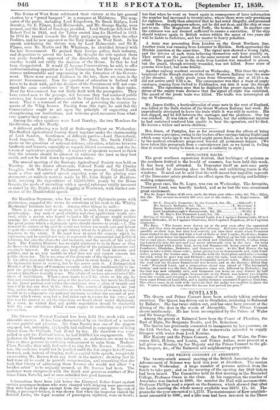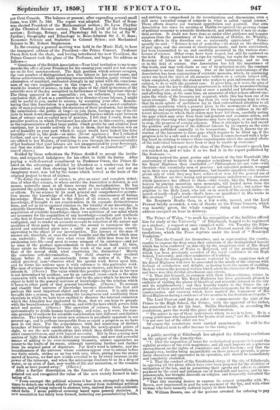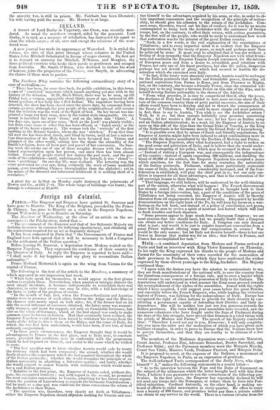THE PRINCE CONSORT AT ABERDEEN",
The twenty-ninth annual meeting of the British Association for the Advancement of Science was held this year at Aberdeen. The session began on Wednesday. A large number of persons arrived from the South to take part ; and on the morning of the opening day 2049 tickets had been issued. The Committee held its first meeting in the Marischal College, Professor Owen in the chair. At his suggestion the number of Associates was limited to 2000, the number the Hall will accommodate. Professor Phillips read a report on the finances, which showed that after the Leeds meeting the whole money available was 26271. 17s. 8d. The grants for the year amounted to 1,2751. The maintenance of Kew establish- ment amounted to 5001., and a like sum had been invested in the Three
per Cent Consols. The balance at present, after expending several small sums, was 1991. 7s. 10d. The report was adopted. The Earl of Rosso was elected President of the Mathematical section; Dr. Lyon Playfair of the Chemical Science section ; Sir Charles Lvell of the Geological section ; Zoology, Botany, and Physiology fell to the lot of Sir W. Jardine ; Geography and Ethnology to Rear-Admiral Sir S. C. Ross ; Economic Science and Statistics to Colonel Sykes ; and Mechanical Science to Mr. Robert Stephenson.
In the evening a general meeting was held in the Music Hall, to hear the inaugural address of the President—the Prince Consort. Professor Owen first took the chair, and having introduced the new President, the Prince Consort took the place of the Professor, and began his address as follows- " Gentlemen of the British Association—Your kind invitation to me to un- dertake the office of your President for the ensuing year could not but startle me on its first announcement. The high position which science occupies, the vast number of distinguished men who labour in her sacred cause, and whose achievements, while spreading innumerable benefits, justly attract the admiration of mankind, contrasted strongly in my mind with the conscious- new of my own insignificance in this respect. I, a simple admirer, and would-be student of science, to take the place of the chief spokesman of the scientific men of the day assembled in furtherance of their important objects! The thing appeared to me impossible ; yet, on reflection, I came to the conclusion that, if not as a contributor to or director of your labours, I might still be useful to you, useful to science, by accepting your offer. Remem- bering that this Association is a popular association, not a secret confrater- nity of men jealously guarding the mysteries of their profession, but inviting the uninitiated—the public at large—to join them, having as one of its ob- jects to break down those imaginary and hurtful barriers which exist between men of science and so-called men of practice, I felt that I could, from the peculiar position in which Providence has placed me in this country, appear as the representative of that large public which profits by and admires your exertions, but is unable actively to join in them, that my election was an act of humility on your part which to reject would have looked like false humility—that is like pride—on mine. (Great applause.) But I reflected
i further, and saw in my acceptance the means, of which necessarily so few are offered to her Majesty, of testifying to you through the instrumentality
of her husband that your labours are not unappreciated by your Sovereign, and that she wishes her people to know this as well as yourselves." (Re- newed cheers.)
Guided by these reflections the Prince decided to accept the invita- tion, and requested indulgence for his effort to fulfil its duties. After paying a well-deserved compliment to Professor Owen, the Prince di- lated on the advantages afforded by Aberdeen as a rendezvous for the Association ; and then showing how that body met a real and not an imaginary want, was led by the terms which served as the basis of the original project to treat of science. "To define the nature of science, to give an exact and complete defini- tion of what that science, to whose service the Association is devoted, is and means, naturally must at all times occupy the metaphysician. He has answered the question in various ways, more or less satisfactory to himself or others. To me science in its most general and comprehensive accepta- tion means the knowledge of what I know, the consciousness of human knowledge. Hence to know is the object of all science, and all special knowledge, if brought to our consciousness in its separate distinctiveness from, and yet in its recognized relation to, the totality of our knowledge, is scientific knowledge. We require, then, for science—that is to say, for the acquisition of scientific knowledge—those two activities of our mind which are necessary for the acquisition of any knowledge—analysis and synthesis —the first to dissect and reduce into its component parts the object to be in- vestigated, and to render an accurate account to ourselves of the nature and qualities of these parts by observation; the second to recompose the ob- served and understood parts into a unity in our consciousness, exactly answering to the object of our investigation. The labours of the man of science are, therefore, at once the most humble and the loftiest which man can undertake. He only does what every little child does from its first awakening into life—and must do every moment of its existence—and yet he aims at the gradual approximation to Divine truth itself. If, then, thsre exists no difference between the work of the man of science and that of the merest child, what constitutes the distinction ? Merely the conscious self-determination. The child observes what accident brings before it, and unconsciously forms its notion of it. The so- called practical man` observes what his special work forces upon him, and he forms his notions upon it with reference to this particular work.
The man of science observes what he intends to observe, and knows why he intends it. (Cheers.) The value which this peculiar object has in his eyes
is not determined by accident, nor by an external cause—such as the mere connexion with work to be performed—but by the place which he knows this object to hold in the general universe of knowledge—by the relation which
it bears to other parts of that general knowledge. (Cheers.) To arrange
and classify that universe of knowledge becomes therefore the first and perhaps the most important object and duty of science. It is only when brought into a system, by separating the incongruous and combining those elements in which we have been enabled to discover the internal connexion which the Almighty has implanted in them, that we can hope to grapple with the boundlessness of His creation, and with the laws which govern both
mind and matter.(Cheers.) The operation of science, then, has been systematically to divide human knowledge, and raise, as it were, the sepa-
rate grounds of subjects for scientific consideration into different and distinct sciences. The tendency to create new sciences is peculiarly apparent in our present age, and is perhaps inseparable from so rapid a progress as we have seen in our days. For the acquaintance with and mastering of distinct branches of knowledge enables the eye, from the newly-gained points of sight, to see the new ramifications into which they divide themselves, in strict consecutiveness, and with logical necessity. But in thus gaining new centres of light from which to direct our researches, and new and powerful means of adding to its ever-increasing treasures, science approaches no nearer to the limits of its range, although travelling further and further from its original point of departure. For God's word is infinite, and the boundlessness of the universe whose confines appear ever to retreat before
our finite minds, strikes us no less with awe, when, prying into the starry crowd of heaven, we find new worlds revealed to us by every increase in the power of the telescope, and when the microscope discloses to us in a drop of water, or an atom of dust, new worlds of life and animation, or the remains of such as have passed away." (Cheers.)
After a further dissertation on the functions of the Association, be pointed out and recognized the value of the new society formed in imi- tation of it.
" From amongst the political sciences it has been attempted in modern times to detach one which admits of being severed from individual political opinions, and of being reduced to abstract laws, derived from well-authenti- cated facts. I mean political economy based upon general statistics. A new association has lately been formed, imitating our perambulating habits,
and striving to comprehend in its investigations and discussions, even a still more extended range of subjects in what is called 'social science.' These efforts deserve our warmest approbation and goodwill. Our own Association has since its meeting at Dublin recognized the growing claims of political economy to scientific brotherhood, and admitted it into its statis- tical section. It could not have done so under abler guidance and happier auspices than the presidency of the Archbishop of Dublin, Dr. Whately, whose efforts in this direction are so universally appreciated." Subse- quently he said : " Science is not of yesterday—we stand on the shoulders of past ages, and the amount of observations made, and facts ascertained, has been transmitted to us, and carefully preserved in the various store- houses of science. Other crops have been reaped, but still lie scattered on the field. Many a rich harvest is ripe for cutting, but waits for the reaper. Economy of labour is the essence of good husbandry, and no less so in the field of science. Our Association has felt the importance of this truth, and may well claim as one of its principal merits the constant endeavour to secure that economy. One of the latest undertakings of the Association has been conjunction of scientific memoirs, which, by combining under one head the titles of all memoirs written on a certain subject will, when completed, enable the student who wishes to gain information on that subject, to do so with the greatest ease. It gives him, as it were, the plan of the house and the key to different apartments in which the measures relating to his subject are stored, saving him at once a painful and laborious search, and affording him, at the same time, an assurance of what is here offered con- tains the whole of the treasures yet acquired, while this has been one of its latest attempts. The Association has from its very beginning kept in view that its main sphere of usefulness lay in that concentrated attention to all scientific operations which a general gives to the movements of his army, watching and regulating the progress of his impetuous soldiers in the dif- ferent directions to which their orders may have led them, carefully noting the gaps which may arise from their independent and eccentric action, and attentively observing what impediments may have stopped, or may threaten to stop, the progress of certain columns. Thus it attempts to fix and record the position and progress of the different labours by its reports on the state of sciences published annually in its transactions. Thus it directs the at- tention of the labourers to those gaps which require to be filled up, if the progress is to be a safe and a steady one. Thus it comes forward with a help- ing hand in striving to remove those impediments which the unaided efforts of the individual labourer have been or may be unable;* overcome."
Only an abridged report of the close of the Prince Consort's speech has yet reached us, and we take it as we find it in the report published by the Scotsman :— Having noticed the great genius and labours of the late Humboldt (the anniversary of whose birth by a singular coincidence happened that day), his Royal Highness thus concluded :—" Philosophers are not vain—vain theorists—but essentially men of practice : not conceited pedants, wrapped up in their own mysterious importance, but humble inquirers after truth— proud only of what they may have achieved or won for the general use of man. Neither are they daring and presumptuous unbelievers—a character which ignorance has affixed to them—who would, like the Titans, storm heaven by placing mountain upon mountain, till hauled down from the height attained by the terrible thunders of outraged Jove ; but rather the pilgrims to the Holy Land, who toil on in search of the sacred shrine—in search of truth—God's truth—God's laws—as manifested in His works in His creation." (Loud and continued applause.) Sir Benjamin Brodie then, in a few words, moved, and the Lord Provost briefly seconded, a vote of thanks to the Prince Consort, which was heartily given, the whole company rising and cheering. The address occupied an hour in delivery.
The Prince of Wales, " to mark his recognition of the facilities offered him for study at the University" of Edinburgh, begged to be registered as a student; a request at once complied with. On Tuesday the Edin- burgh Town Council met, and the Lord Provost moved the following resolutions, which the Times reprints under the head of " Municipal Toadyism." " 1. That the Council for themselves, and as representing the county, resolve to express the deep sense they entertain of the distinguished honour which has been conferred on this city by the auspicious visit of His Royal Highness the Prince of Wales to Holyrood, and of the gratifying proof which has been graciously accorded of the royal confidence in our High School, University, and other seminaries of learning.
" 2. That the distinguished honour conferred by the auspicious visit of his Royal Highness will ever be associated in the minds of the citizens with feelings of satisfaction and delight, as having been the means of enabling them to witness the personal virtues which adorn the character of the Prince, and have won thir dutiful attachment and esteem.
" 3. That this Council, in common with their fellow-citizens' rejoice in the opportunity which His Royal Highness has been graciously pleased to embrace of visiting the places of historical and scientific interest in the city and its neighbourhood ; and they humbly tender to the Prince the ex- pression of their grateful and respectful acknowledgments for the unvarying condescension and courtesy which have marked the demeanour of His
Roy during a residence of two months in the Scottish metropolis."
The Lord Provost said that in order to commemorate the visit of the Prince to the High School, the Prince, with the approval of his father, has consented to sit for his bust. Baillie Blackadder, in seconding the resolutions, gave the world this piece of information.
" The prince is one of those individuals whom to see is to love. He is a young gentleman who has gained the hearts dell men," and Mr. Blackadder " is not sure but of the other sex too."
Of course the resolutions were carried unanimously. It will be the turn of Oxford next to offer incense to the rising sun.
A public meeting at Edinburgh has adopted the following resolutions on the subject of the Annuity-tax.
" 1. That the imposition of taxes for ecclesiastical purposes is beyond the rightful province of the civil magistrate, and all such imposts arc a grievous encroachment on the rights of conscience and civil freedom ; and that the Annuity-tax, besides being unjustifiable on these general grounds, is pecu- liarly obnoxious and oppressive in its operation, and should be immediately and completely abolished. " 2. That the conduct of the Established clergy of the city of Edinburgh, in opposing all the plans which have ever been proposed for the abolition or mitigation of the tax, and in permitting their agents and officers to enforce payment by the cruel and inhuman use of handcuffs and knives, and by im- prisonments, has brought discredit on religion and frequently disturbed the peace of the community. "That this meeting desires to express its earnest sympathy with Mr. Brown, now imprisoned in gaol for non-payment of the tax, and with other victims who have recently suflbred injury at their bands." Mr. William Brown, one of the persons arrested for refusing to pay
the annuity tax, is still in prison. Mr. Fairbain has been liberated ; his wife having paid the money. Mr. Hunter is at large.




























 Previous page
Previous page